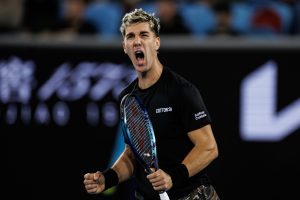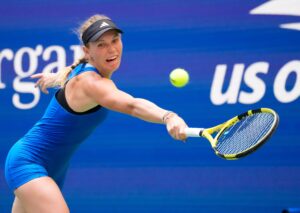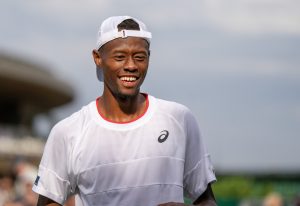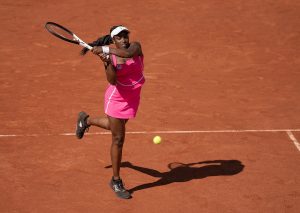When Novak Djokovic watched a Rafael Nadal backhand sail long, when he sank to his knees to kiss the Plexicushion surface of the Rod Laver Arena and listen to the adulation of the crowd, he had done more than just win a seventh Australian Open crown. That, though impressive enough in its own right, was only a part of his triumph. The wider significance was that the Serbian had just won his 15th Major title. That left him still five behind Roger Federer and two short of Rafael Nadal, but, crucially one clear of Pete Sampras.
The same Pete Sampras who was once so dominant a force in the men’s game that he finished six consecutive years on top of the world rankings between 1993 and 1998. By the time he hung up his racquet in 2002, after winning his 14th Grand Slam at the US Open, he had amassed a catalogue of records that seemed destined to stand the test of time. Not two decades later, few remain as a trio of players have combined to pull apart his legacy, stitch by stitch.
Federer has reigned for longer atop the world rankings and claimed eight Wimbledon titles to Sampras’ seven. Nadal has shattered record after record at Roland Garros, winning 11 titles there as well as one Australian Open, two Wimbledons, and three US Opens. Djokovic has assembled arguably the most complete resume in history, which includes titles at all four Slams, the nine Masters 1000s, the Davis Cup, and the Tour Finals. Sampras never even reached the final in Paris.
Sampras ended his career with two more Major titles to his name than any other player in the history of the sport. He now finds himself relegated to fourth place behind Djokovic, a man who looks certain to extend his advantage over the coming years and who unlike Sampras has won all four at least once. Sampras once had a strong claim to being the greatest player of all time, now he would surely see his claim to such a title laughed out of court.
But rather than the dethroning of Sampras leading to the end of the greatest of all time debate, it instead simply led to the American being replaced by the first of his conquerors, Roger Federer. A player so beloved by his fans that they have compared watching him to a religious experience. The man that stood above and beyond all that had come before and all those that were yet to come. The greatest that there had ever been or would ever be.
Even when his record haul of Majors came under threat from Nadal and Djokovic, he rose from the ashes of injury to add three more to his tally between 2017 and 2018. Now, though 37, few would risk ruling him out of future glory. He has defied the expectations of time before, why should he not do so again? Perhaps he will. His attacking brand of tennis asks comparatively little of his body and can make him all but invincible on the fast courts at Melbourne Park and Wimbledon.
Or will Nadal, that most dogged of competitors, recover the good health that has so long eluded him? The hulking Spaniard, all fire and fight, his forehand fearsome, his will granite, has brought even the very best to their knees more than once, unable to rise to the bell to take more punishment at his hands. And though it has been 14 years since he claimed his first title at Roland Garros, he looks as secure in his mastery of the clay now as he did then.
Djokovic, meanwhile, is renewed. In 2016, he scaled a peak higher than any in the men’s game had since Rod Laver in 1969, when he won all four Majors in a row. The effort seemed to have broken him and he endured two long years in the wilderness, at one point falling outside the world’s top 20. But he rediscovered his winning touch at Wimbledon last July and has since climbed the mountain once again, reigning unchallenged atop the world rankings as the defending champion at three of the four slams.
In short, Federer could yet win more Majors. Nadal or Djokovic, or both, could yet overhaul him. But would it really matter? At a certain point, when enough titles are won, does it not become meaningless to compare their achievements against one another without end? It is a truly intractable process. Arguments can be made to undermine the achievements of all three or to compare them unfavourably with the great champions of the past.
And even if the achievements of one could be placed squarely and fairly above the rest, what of the players who have yet to begin their own reigns at the top of the game? Could greatness not also lurk in the swashbuckling Denis Shapovalov, the formidable strength of Alexander Zverev, the elegance of Stefanos Tsitsipas, and the easy power of Karen Khachanov? They may never come close to matching the achievements of the great three that have long ruled the sport, but others, still unheard of, may.
The debate over who is the greatest of all time will probably never end. The increased tribalism of tennis’ fans alone will most likely see to that. But would it not be better if it did? The time of Federer, Nadal, and Djokovic is already mostly spent. So for what time they still have, instead of comparing them, instead acknowledge how much they have brought to the sport, cherish every jaw-dropping winner and seemingly impossible victory.
Because, greatest of all time or not, we’ll miss them when they are gone.
Main Photo:
Embed from Getty Images






